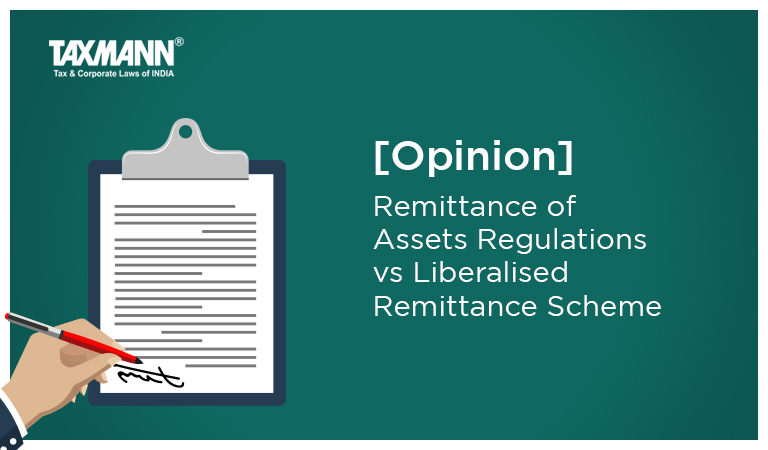[Opinion] Remittance of Assets Regulations vs Liberalised Remittance Scheme
- Blog|News|Income Tax|
- 2 Min Read
- By Taxmann
- |
- Last Updated on 25 July, 2022

CA Sri Harsha, CA Narendra & D V K Phanindra – [2022] 140 taxmann.com 482 (Article)
A person in India may remit amount to outside India under various situations. In order to regulate such remittances, various regulations have been inserted under Foreign Exchange Management Act, 1999 (‘FEMA’) and Income – tax Act, 1961 (‘ITA’). In this article, the concept of remittance of amount to outside India by Individual has been discussed in detail.
An Individual may remit amount to outside India for various purposes viz. foreign trip, foreign education, medical facilities, investment in abroad, sale proceeds of investments in India, income earned in India etc.,
Before proceeding to understanding the provisions relating to remittance of amount to outside India, it is required to understand the residential status under FEMA and ITA. This is because, an individual being a resident in India may remit the amount to outside for above mentioned purposes under Liberalized Remittance Scheme (‘LRS’). However, non-residents in India are not permitted to remit the amount under LRS but they may remit the amount to abroad under remittance of assets regulations subject to other conditions.
Under FEMA, concept of resident in India has been defined under section 2(v) of FEMA and such residential status has to be determined based on the intention and purpose of leaving India/coming to India. However, residential status under section 6 of ITA has to be determined based on number of days of stay in India.
Further, once number of days of stay in India has been determined, individual may become resident/non-resident for entire year under ITA, whereas under FEMA, such person may be treated as resident/non-resident from the date of coming to India/leaving India, as the case may be. This drives home a point that determination of residential status under FEMA and ITA are independent to each other, and such person has to be considered as resident/non-resident according to provisions of respective Acts.
If such person is considered as a non-resident in India under the provisions of ITA, amount paid to such person may be chargeable to tax in India and tax may have to be withheld on such payment under Section 195 of ITA. Further, through the Finance Act, 2020, a new sub section has been inserted in section 206C(1G) in order to make tax collection at source (for brevity ‘TCS’) provisions applicable to foreign remittances under LRS. In this article, a comparative analysis has been made between remittance of assets regulations and LRS under the provisions of FEMA and ITA.
Click Here To Read The Full Article
Disclaimer: The content/information published on the website is only for general information of the user and shall not be construed as legal advice. While the Taxmann has exercised reasonable efforts to ensure the veracity of information/content published, Taxmann shall be under no liability in any manner whatsoever for incorrect information, if any.

Taxmann Publications has a dedicated in-house Research & Editorial Team. This team consists of a team of Chartered Accountants, Company Secretaries, and Lawyers. This team works under the guidance and supervision of editor-in-chief Mr Rakesh Bhargava.
The Research and Editorial Team is responsible for developing reliable and accurate content for the readers. The team follows the six-sigma approach to achieve the benchmark of zero error in its publications and research platforms. The team ensures that the following publication guidelines are thoroughly followed while developing the content:
- The statutory material is obtained only from the authorized and reliable sources
- All the latest developments in the judicial and legislative fields are covered
- Prepare the analytical write-ups on current, controversial, and important issues to help the readers to understand the concept and its implications
- Every content published by Taxmann is complete, accurate and lucid
- All evidence-based statements are supported with proper reference to Section, Circular No., Notification No. or citations
- The golden rules of grammar, style and consistency are thoroughly followed
- Font and size that’s easy to read and remain consistent across all imprint and digital publications are applied



 CA | CS | CMA
CA | CS | CMA
